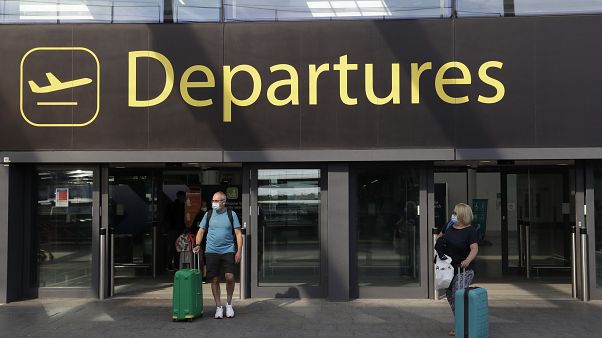Global air traffic won’t recover from COVID-19 until 2024, says airline body
Passengers walk out of Departures, at the North Terminal of Gatwick Airport near Crawley, just south of London, Wednesday, July 22, 2020.
Global air traffic will not return to pre-coronavirus levels until at least 2024, a year later than previously anticipated, the International Air Transport Association (IATA) said on Tuesday.
One of the reasons cited by the IATA for the “more pessimistic” outlook is the slow virus containment in the US and developing economies.
“Although developed economies outside of the US have been largely successful in containing the spread of the virus, renewed outbreaks have occurred in these economies, and in China,” the IATA noted.
“Furthermore there is little sign of the virus containment in many important emerging economies, which in combination with the US, represent 40% of global air travel markets,” it added.
Other factors for the delay include reduced corporate travel and weak consumer confidence with people preferring to postpone travel because of concerns over job security and rising unemployment and fears of catching COVID-19.
The organisation expects enplanements to fall by 55 per cent in 2020 compared to 2019 and stressed that although passenger numbers should rebound by 62 per cent in 2021, it will still be down by nearly a third compared to 2019.
As such, a full recovery to 2019 levels in passenger numbers is not expected until 2023.
Furthermore, as domestic markets are reopening faster than international markets, RPKs (Revenue Passenger Kilometres) will recover even more slowly, with passenger traffic expected to return to pre-crisis levels in 2024, also one year later than previously forecast.
International traffic shrank by 96.8 per cent in June compared to the same month last year. European carriers, meanwhile, saw demand collapse 96.7 per cent in June versus a year ago following a 98.7 per cent decline in May.
“Scientific advances in fighting COVID-19 including the development of a successful vaccine, could allow a faster recovery. However, at present there appears to be more downside risk than upside to the baseline forecast,” the IATA stressed.
According to Alexandre de Juniac, IATA’s Director General and CEO, international traffic accounts for two-thirds of global air travel in normal times.
Summer, which is usually the business season, he added, is providing little upswing because many countries remain closed or have imposed “demand-killing quarantines”.
“For airlines, this is bad news that points to the need for governments to continue with relief measures — financial and otherwise,” he went on.
He also called for governments to implement measures to boost confidence in air travel including “accurate, fast, scalable and affordable” testing and contact tracing measures.
Several European Union countries have already provided assistance to their national carriers.
Air France has been granted a €7 billion state bailout but still announced earlier this month that it would have to cut 7,500 jobs to ride out the economic impact of the crisis.
KLM, the Netherlands’ flag carrier, is to receive €3.4 billion in funding from the state coffers, while Germany has approved a €9 billion rescue plan for Lufthansa.

